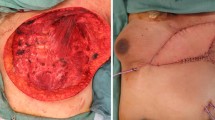Abstract
Background
Inflammatory breast cancer (IBC) is a rare and aggressive disease treated with multimodality therapy: preoperative systemic therapy (PST) followed by modified radical mastectomy (MRM), chest wall and regional nodal radiotherapy, and adjuvant biologic therapy and/or endocrine therapy when appropriate. In non-IBC, the degree of pathologic response to PST has been shown to correlate with time to recurrence (TTR) and overall survival (OS). We sought to determine if pathologic response correlates with oncologic outcomes of IBC patients.
Methods
Following review of IBC patients’ records (1997–2014), we identified 258 stage III IBC patients; 181 received PST followed by MRM and radiotherapy and were subsequently analyzed. Pathologic complete response (pCR) to PST, hormone receptor and human epidermal growth factor receptor 2 (HER2) status, grade, and histology were evaluated as predictors of TTR and OS by Cox model.
Results
Overall, 95/181 (52%) patients experienced recurrence; 93/95 (98%) were distant metastases (median TTR 3.2 years). Seventy-three patients (40%) died (median OS 6.9 years). pCR was associated with improved TTR (hazard ratio [HR] 0.20, 95% confidence interval [CI] 0.09–0.46, p < 0.01, univariate; HR 0.17, 95% CI 0.07–0.41, p < 0.0001, multivariate) and improved OS (HR 0.26, 95% CI 0.11–0.65, p < 0.01, univariate). In patients with pCR, grade III (HR 1.91, 95% CI 1.16–3.13, p = 0.01), and triple-negative phenotype (HR 3.54, 95% CI 1.79–6.98, p = 0.0003) were associated with shorter TTR, while residual ductal carcinoma in situ was not (HR 0.85, 95% CI 0.53–1.35, p = 0.48, multivariate).
Conclusions
In stage III IBC, pCR was associated with prognosis, further influenced by grade, hormone receptor, and HER2 status. Investigating mechanisms that contribute to better response to PST could help improve oncologic outcomes in IBC.



Similar content being viewed by others
References
Yamauchi H, Woodward WA, Valero V, et al. Inflammatory breast cancer: what we know and what we need to learn. Oncologist 2012; 17: 891–9.
Overmoyer BA. Inflammatory breast cancer: novel preoperative therapies. Clin Breast Cancer 2010; 10: 27–32.
Mamounas EP, Anderson SJ, Dignam JJ, et al. Predictors of locoregional recurrence after neoadjuvant chemotherapy: results from combined analysis of National Surgical Adjuvant Breast and Bowel Project B-18 and B-27. J Clin Oncol 2012; 30: 3960–6.
Swisher SK, Vila J, Tucker SL, et al. Locoregional control according to breast cancer subtype and response to neoadjuvant chemotherapy in breast cancer patients undergoing breast-conserving therapy. Ann Surg Oncol 2016; 23: 749–56.
von Minckwitz G, Untch M, Blohmer JU, et al. Definition and impact of pathologic complete response on prognosis after neoadjuvant chemotherapy in various intrinsic breast cancer subtypes. J Clin Oncol 2012; 30: 1796–804.
Houssami N, Macaskill P, von Minckwitz G, Marinovich ML, Mamounas E. Meta-analysis of the association of breast cancer subtype and pathologic complete response to neoadjuvant chemotherapy. Eur J Cancer 2012; 48: 3342–54.
Harris EE, Schultz D, Bertsch H, Fox K, Glick J, Solin LJ. Ten-year outcome after combined modality therapy for inflammatory breast cancer. Int J Radiat Oncol Biol Phys 2003; 55: 1200–8.
Liu J, Chen K, Jiang W, et al. Chemotherapy response and survival of inflammatory breast cancer by hormone receptor- and HER2-defined molecular subtypes approximation: an analysis from the National Cancer Database. J Cancer Res Clin Oncol 2017; 143: 161–8.
Pierga JY, Petit T, Levy C, et al. Pathological response and circulating tumor cell count identifies treated HER2+ inflammatory breast cancer patients with excellent prognosis: BEVERLY-2 survival data. Clin Cancer Res 2015; 21: 1298–304.
Edge S, Byrd DR, Compton CC, Fritz AG, Greene FL, Trotti A (eds). AJCC cancer staging manual. 7th Edition. New York: Springer New York; 2011.
Dawood S, Merajver SD, Viens P, et al. International expert panel on inflammatory breast cancer: consensus statement for standardized diagnosis and treatment. Ann Oncol 2011; 22: 515–23.
Rueth NM, Lin HY, Bedrosian I, Shaitelman SF, Ueno NT, Shen Y, et al. Underuse of trimodality treatment affects survival for patients with inflammatory breast cancer: an analysis of treatment and survival trends from the National Cancer Database. J Clin Oncol 2014; 32: 2018–24.
Bristol IJ, Woodward WA, Strom EA, et al. Locoregional treatment outcomes after multimodality management of inflammatory breast cancer. Int J Radiat Oncol Biol Phys 2008; 72: 474–84.
Gianni L, Eiermann W, Semiglazov V, et al. Neoadjuvant chemotherapy with trastuzumab followed by adjuvant trastuzumab versus neoadjuvant chemotherapy alone, in patients with HER2-positive locally advanced breast cancer (the NOAH trial): a randomised controlled superiority trial with a parallel HER2-negative cohort. Lancet 2010; 375: 377–84.
Mego M, Giordano A, De Giorgi U, et al. Circulating tumor cells in newly diagnosed inflammatory breast cancer. Breast Cancer Res 2015; 17: 2.
Hall CS, Karhade M, Laubacher BA, et al. Circulating tumor cells and recurrence after primary systemic therapy in stage III inflammatory breast cancer. J Natl Cancer Inst 2015; 107:djv250.
Youn T, Jacene H, Dipiro P, et al. Metabolic characterization of inflammatory breast cancer (IBC) with baseline FDG-PET/CT: relationship with histopathology, hormone receptor status, and pathologic response after neoadjuvant chemotherapy [abstract]. J Clin Oncol 2013; 31: 1105.
Champion L, Lerebours F, Alberini JL, Fourme E, Gontier E, Bertrand F, et al. 18F-FDG PET/CT to predict response to neoadjuvant chemotherapy and prognosis in inflammatory breast cancer. J Nucl Med 2015; 56: 1315–21.
Disclosures
None.
Author information
Authors and Affiliations
Corresponding author
Rights and permissions
About this article
Cite this article
Nakhlis, F., Regan, M.M., Warren, L.E. et al. The Impact of Residual Disease After Preoperative Systemic Therapy on Clinical Outcomes in Patients with Inflammatory Breast Cancer. Ann Surg Oncol 24, 2563–2569 (2017). https://doi.org/10.1245/s10434-017-5903-6
Received:
Published:
Issue Date:
DOI: https://doi.org/10.1245/s10434-017-5903-6




